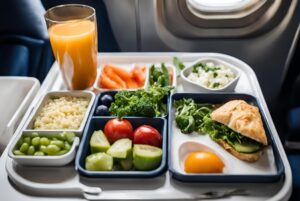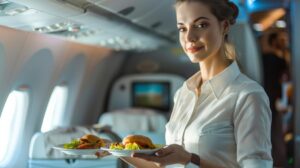In the fast-paced world of aviation, where precision, alertness, and physical stamina are paramount, the significance of a well-balanced diet cannot be overstated. For pilots, cabin crew, air traffic controllers, and even ground staff, maintaining optimal health is crucial not only for personal well-being but also for the safety and efficiency of the entire aviation operation.
An effective diet, tailored to the specific demands of the aviation industry, plays a pivotal role in enhancing performance, reducing fatigue, and ensuring that aviation professionals are at the top of their game. In this article we will look at the role of diet in the aviation industry, emphasizing the importance of tailored nutrition for different roles and highlighting the connection between diet and safety.
Importance of nutrition in aviation

Flight attendants and pilots undergo considerable occupational pressures, such as shift work, sedentary work, stress, and manual work through handling aircraft equipment. A balanced diet plays a key role in overcoming these challenges as it supplies adequate nutrients required for the brain, stamina, and the rest of the body.
1. Cognitive Function and Alertness
The nature of operations in aviation creates the need for neat mental cognition capabilities such as decision-making, perception, and problem-solving. There are vitamins that can be beneficial in positively impacting the human brain; these are omega-3 fatty acids, B vitamins, and antioxidants. For example, omega-3 fatty acids which are found in such foods as salmon fish, and flax seeds are necessary for the structure and functioning of brain cells.
Vitamins B6, B9 (folic acid), and B12 are components of neurotransmitters that are associated with moods and thinking. These neurotransmitters are cholinergic and selective serotonin reuptake inhibitors. Correct nutrition increases the capacities of the brain, including aviation personnel, if they adhere to a diet that is based on fruits, vegetables, lean protein products, whole grains, and others.
2. Physical Endurance and Fatigue Management
In the line of duty, the aviation sector requires physical strength, especially from pilots and attendants who may go for long hours flying and dealing with the physical challenges of height differences. There is a good chance to have a qualitative and quantitative eating plan for complex carbohydrates, lean proteins, and healthy fats for all-day energy.
The complex carbohydrates like whole grains and legumes, are burnt at a slower rate, thus ensuring that the blood sugar levels remain balanced thereby eliminating the instance of fatigue. For growing muscles, protein such as lean meat, poultry, eggs, tofu, and some forms of vegetables like legumes are important for those in physically straining careers.
3. Coping with Stress and Mental Health
Stress is a common phenomenon due to the high pressure that is associated with aviation thus if not controlled, the outcome may be disastrous. Stress can be fought off by taking foods containing magnesium, zinc, and vitamin C as these help to control the body’s stress response and strengthen the immune system.
Magnesium is responsible for muscle relaxation besides helping calm the nervous system. Stress is typically combated with the regular consumption of fruit, especially citrus fruits, berries, and bell peppers all of which contain vitamins specifically vitamin C.
4. Dietary Considerations for Different Aviation Roles

The dietary needs of aviation professionals vary based on their roles. Here’s a breakdown of tailored dietary recommendations for key roles within the industry:
1. Pilots
Like any other professional who has to focus, make life-and-death decisions, and deal with stress, pilots need a good diet to be able to sustain endurance and maintain a clear head. Breakfast, lunch, and dinner should provide a combination of carbohydrates that are not easily digestible, lean meat, and fat respectively.
For instance, the consumption of grilled chicken with steamed quinoa and vegetables gives the body adequate macronutrient foods.
Also, pilots should drink enough water because dehydration is fertile for exhaustion and weak memory. Snacks such as nuts, yogurt, or fruits can go a long way in ensuring that one does not develop fatigue during flight.
2. Cabin Crew
The personnel working in the cabin must keep up with the physical workload, shift work, and job stress involving passenger relations. It is essential to take foods that contain antioxidants, vitamins, and minerals to the body. A healthy diet should be constituted for them majoring in fruits and vegetables, whole grains, and lean meats.
Some of the nutrients that should be included in the diet are foods that are rich in iron like spinach and lean red meats; anemia causes fatigue.
3. Air Traffic Controllers
The goals of air traffic controllers demand a continuous and rigorous focus of attention so as to maintain a state of clear thinking. Cognitive functioning can also be enhanced by the consumption of brain foods hitherto mentioned such as fatty fish, nuts and seeds, and green leafage.
Eating these small portions of food on a regular basis will assist in avoiding slumps in focus due to low energy levels. One must include omega-3 fatty acids and antioxidants such as berries and nuts in one’s diet in order to boost awareness and avoid the ravages of burnout.
4. Ground Staff
They require meals that will help in muscle growth and recovery because they stand for most of the day. Eating habits should involve taking carbohydrates in combination with proteins and fats with special reference to foods that help in muscle recovery including lean meat, milk products, and plant-based sources of proteins. Because the body is mostly made of water, it is also essential to always drink enough of it, particularly in hot weather and when performing difficult tasks.
Also Read: Importance Of Safety In Aviation Training
The Role of Supplementation
It is important to note that primary sources of nutrition should be obtained through foods, however, supplementation can help to cover certain deficiencies. For example, pilots and air traffic controllers could take omega-3 supplements because their brains could use them, and their food may not be supplying them with omega-3s anyway. Those who do not receive enough sun exposure may also need to take vitamin D supplements because the body needs this vitamin for immune system function, mood management, and bone health.
But this should be done cautiously because the role of supplements cannot be denied. Not all the supplement products available in the market for human consumption are the same; in fact, some are dangerous to one’s health and particularly hazardous to professionals in the flying business.
For instance, some of them may have ingredients that can induce sleep or react with the drugs, which in turn affects one’s performance. Due to this, aviation professionals should always seek medical attention especially when intending to take supplements so that they can get advice on the best supplements to take.
Conclusion
In conclusion, the cost of a good diet can be greatly felt in the aviation industry since it affects all areas of mental processing, physical strength, general health, and force safety. With a focus on nutrition, flight personnel can improve their productivity, avoid exhaustion, and thus make their sphere less dangerous and more effective. So you see, with the ever-changing face of aviation, so too does the diet and nutrition, to make certain that the people who protect and serve the airways are ready to soar.
FAQ
1. Can dietary habits influence the long-term career health of aviation professionals?
Yes, long-term dietary habits play a significant role in preventing chronic conditions such as obesity, cardiovascular disease, and diabetes, which can impact an aviation professional’s medical certification and career longevity. Maintaining a healthy diet throughout one’s career can support long-term health and career sustainability.
2. What are some quick, healthy snack options for aviation professionals during flights?
Aviation professionals can carry portable, nutrient-dense snacks such as mixed nuts, dried fruits, whole grain crackers with nut butter, yogurt, and fresh fruits. These snacks provide a good balance of carbohydrates, proteins, and fats, helping to sustain energy levels during long flights or shifts.
3. How can aviation professionals ensure they get enough nutrients while on the go?
To ensure adequate nutrient intake while traveling, aviation professionals should opt for whole, minimally processed foods whenever possible. They can also consider meal prepping, bringing along supplements if needed, and choosing healthier options at airport restaurants, such as salads, grilled proteins, and whole-grain sides.
